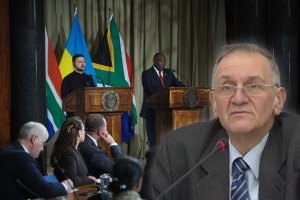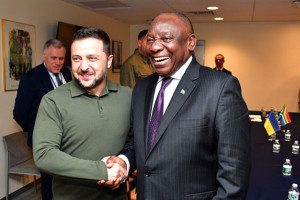Ukraine’s missile challenge: what are the potential political risks?
A few days ago, a sensational article was published by the The New York Times with the eloquent headline “North Korea’s Missile Success Is Linked to Ukrainian plant, Investigators Say”. The authors of this article made reference to an interview of a missile expert of the International Institute for Strategic Studies (IISS) Michael Elleman, who voiced his presumption that the Ukrainian state enterprise “Pivdenmash” could be the “most probable source” of engines for North Korean missiles, which were successfully tested in July of this year. Later, the press service of the “Pivdenmash” enterprise denied such information. Secretary of the National Security and Defense Council of Ukraine Oleksandr Turchynov, in his turn, noted that Ukraine complies with all international obligations it assumed and did not supply any arms or military technology to North Korea.
Not accusation but a presumption?
First of all, it is important to note that in the text of the aforementioned publication of the NYT no direct allegations were made against Ukraine and its leadership, rather only presumptions of the possibility that RD-250 engines manufactured in Ukraine ended up in North Korea, for instance, from the black market. The accent in the article has significant meaning since the rocket engines manufactured in Ukraine did not necessarily arrive to North Korea directly from Ukraine.
In light of the long history of joint industrial cooperation of Russian enterprises with Ukrainian companies, including in the sphere of rocket design and construction, the possibility that technology or RD-250 engines manufactured in Ukraine ended up in North Korea through the Russian enterprise “Energomash” as an intermediary cannot be ruled out. As missile expert Michael Elleman noted, it is possible that the corresponding excess engines are currently being stored in Russian warehouses.
Besides that, as acting head of the State Space Agency of Ukraine Yuriy Radchenko noted during a recent briefing, the RD-250 engines were produced in Ukraine only up to 2001 in the interests of Russia and were supplied there as part of a space rocket. Herewith, as Radchenko affirmed “Ukraine did not independently execute any deliveries from the moment it became independent over the period that the use of this equipment was mastered”.
In the assessments of hypothetical possibilities of the supply of rocket engines from Ukraine the factors of the considerable territorial distance between Ukraine and North Korea and the absence between the two countries of a common border should also be taken into account. Purely from a logistical point of view it makes the possibility of the alleged direct contraband of the aforementioned engines from Ukraine far too complicated task. It is considerably easier to realize such a scenario through the adjacent to the DPRK territories of Russia or China with whom Pyongyang, among other things, collaborates with in the spheres of defense and security.
Potential political risks
Despite the fact that direct accusations have after all not been made against Ukraine while the suspicions set out in the sensational article of the NYT are rather hypothetical in nature, this story could potentially have a negative impact on Ukraine’s international reputation as well as on its relations with the United States. As it is known, the U.S. assumptions about the ostensible supply by Ukraine of the ‘Kolchuga’ radar system to Iraq in 2002 has never been proven by the American side, which however did not prevent this story from becoming a factor of notable cooling of relations between official Kyiv and Washington at that time.
Alongside this the latest official reaction of the U.S. Department of State regarding the alleged supply of rocket engines manufactured in Ukraine to North Korea was relatively reserved and level-headed. Indeed, the official representative of the U.S. Department of State Heather Nauert in a recent briefing informed that Washington’s “position on this issue (regarding the supply of rocket engines to North Korea - auth.) is very serious if this information is confirmed”. Moreover, the spokesperson of the U.S. Department of State noted that Ukraine “has a reliable history of efforts in the sphere of non-proliferation, especially regarding North Korea”. In connection with this there are certain grounds to consider that in the event of operative provision by the Ukrainian side of incontrovertible evidence of non-complicity in the supply of rocket engines to North Korea, the sensational story based on the NYT publication will not lead to any worsening of bilateral relations between Ukraine and the U.S.
However, the pop up of the unconfirmed information that casts a shadow of doubt on Ukraine is today capable of indirectly influencing Washington’s current debate on the possibility of providing Ukraine with lethal defense weapons. The appearance of the compromising material regarding Ukraine right at the stage of serious consideration of the aforementioned issue in the White House might serve as indirect testimony to the motives that could potentially be behind its appearance at this given moment.
After all, the possibility of providing Ukraine with lethal defense weapons is currently a heated issue of debate in Washington and a final decision has not yet been made. In connection with this, even unconfirmed information that could one way or another point to the fact that Ukraine is ostensibly incapable of effectively controlling strategically important technologies or weaponry could instill a significant level of fear in Washington. This, in its turn, could tip the scale in favor of those representatives of the American establishment who do not support the idea of granting Ukraine with lethal defense weapons because of the alleged unreliability of Kyiv and posing high risks of American strategic weapons falling into “third hands”.
In order to minimize the aforementioned risks and accusations the official authorities of Ukraine and diplomats should convincingly confirm by submission of all necessary documentation and factual information the non-complicity of Kyiv in the supply of any kind of rocket technologies to Pyongyang, as well as substantiate the impossibility of effectuating such supplies through export channels due to the international obligations which Ukraine complies with regarding, in particular membership in the Missile Technology Control Regime (MTCR). Taking the initiative in organizing an international investigation regarding how the notable progress in the development of the North Korean nuclear missile program of late became possible would also be a significant step in the process of “whitewashing” the international image of Ukraine on the backdrop of the currently unfavorable information background.
Original: Ukrainian Interest








